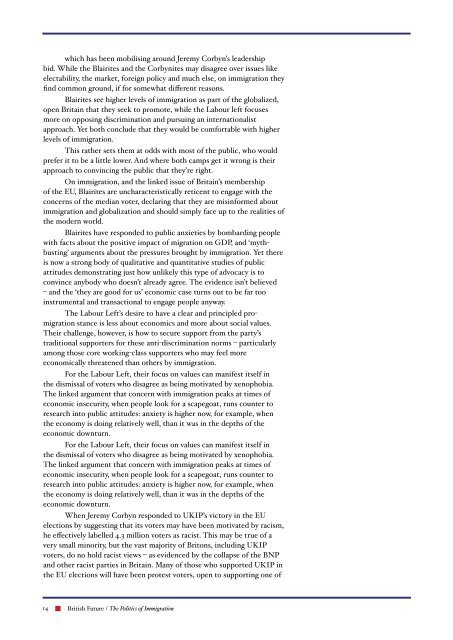THE POLITICS OF IMMIGRATION
The-politics-of-immigration
The-politics-of-immigration
Create successful ePaper yourself
Turn your PDF publications into a flip-book with our unique Google optimized e-Paper software.
which has been mobilising around Jeremy Corbyn’s leadership<br />
bid. While the Blairites and the Corbynites may disagree over issues like<br />
electability, the market, foreign policy and much else, on immigration they<br />
find common ground, if for somewhat different reasons.<br />
Blairites see higher levels of immigration as part of the globalized,<br />
open Britain that they seek to promote, while the Labour left focuses<br />
more on opposing discrimination and pursuing an internationalist<br />
approach. Yet both conclude that they would be comfortable with higher<br />
levels of immigration.<br />
This rather sets them at odds with most of the public, who would<br />
prefer it to be a little lower. And where both camps get it wrong is their<br />
approach to convincing the public that they’re right.<br />
On immigration, and the linked issue of Britain’s membership<br />
of the EU, Blairites are uncharacteristically reticent to engage with the<br />
concerns of the median voter, declaring that they are misinformed about<br />
immigration and globalization and should simply face up to the realities of<br />
the modern world.<br />
Blairites have responded to public anxieties by bombarding people<br />
with facts about the positive impact of migration on GDP, and ‘mythbusting’<br />
arguments about the pressures brought by immigration. Yet there<br />
is now a strong body of qualitative and quantitative studies of public<br />
attitudes demonstrating just how unlikely this type of advocacy is to<br />
convince anybody who doesn’t already agree. The evidence isn’t believed<br />
– and the ‘they are good for us’ economic case turns out to be far too<br />
instrumental and transactional to engage people anyway.<br />
The Labour Left’s desire to have a clear and principled promigration<br />
stance is less about economics and more about social values.<br />
Their challenge, however, is how to secure support from the party’s<br />
traditional supporters for these anti-discrimination norms – particularly<br />
among those core working-class supporters who may feel more<br />
economically threatened than others by immigration.<br />
For the Labour Left, their focus on values can manifest itself in<br />
the dismissal of voters who disagree as being motivated by xenophobia.<br />
The linked argument that concern with immigration peaks at times of<br />
economic insecurity, when people look for a scapegoat, runs counter to<br />
research into public attitudes: anxiety is higher now, for example, when<br />
the economy is doing relatively well, than it was in the depths of the<br />
economic downturn.<br />
For the Labour Left, their focus on values can manifest itself in<br />
the dismissal of voters who disagree as being motivated by xenophobia.<br />
The linked argument that concern with immigration peaks at times of<br />
economic insecurity, when people look for a scapegoat, runs counter to<br />
research into public attitudes: anxiety is higher now, for example, when<br />
the economy is doing relatively well, than it was in the depths of the<br />
economic downturn.<br />
When Jeremy Corbyn responded to UKIP’s victory in the EU<br />
elections by suggesting that its voters may have been motivated by racism,<br />
he effectively labelled 4.3 million voters as racist. This may be true of a<br />
very small minority, but the vast majority of Britons, including UKIP<br />
voters, do no hold racist views – as evidenced by the collapse of the BNP<br />
and other racist parties in Britain. Many of those who supported UKIP in<br />
the EU elections will have been protest voters, open to supporting one of<br />
14 British Future / The Politics of Immigration


